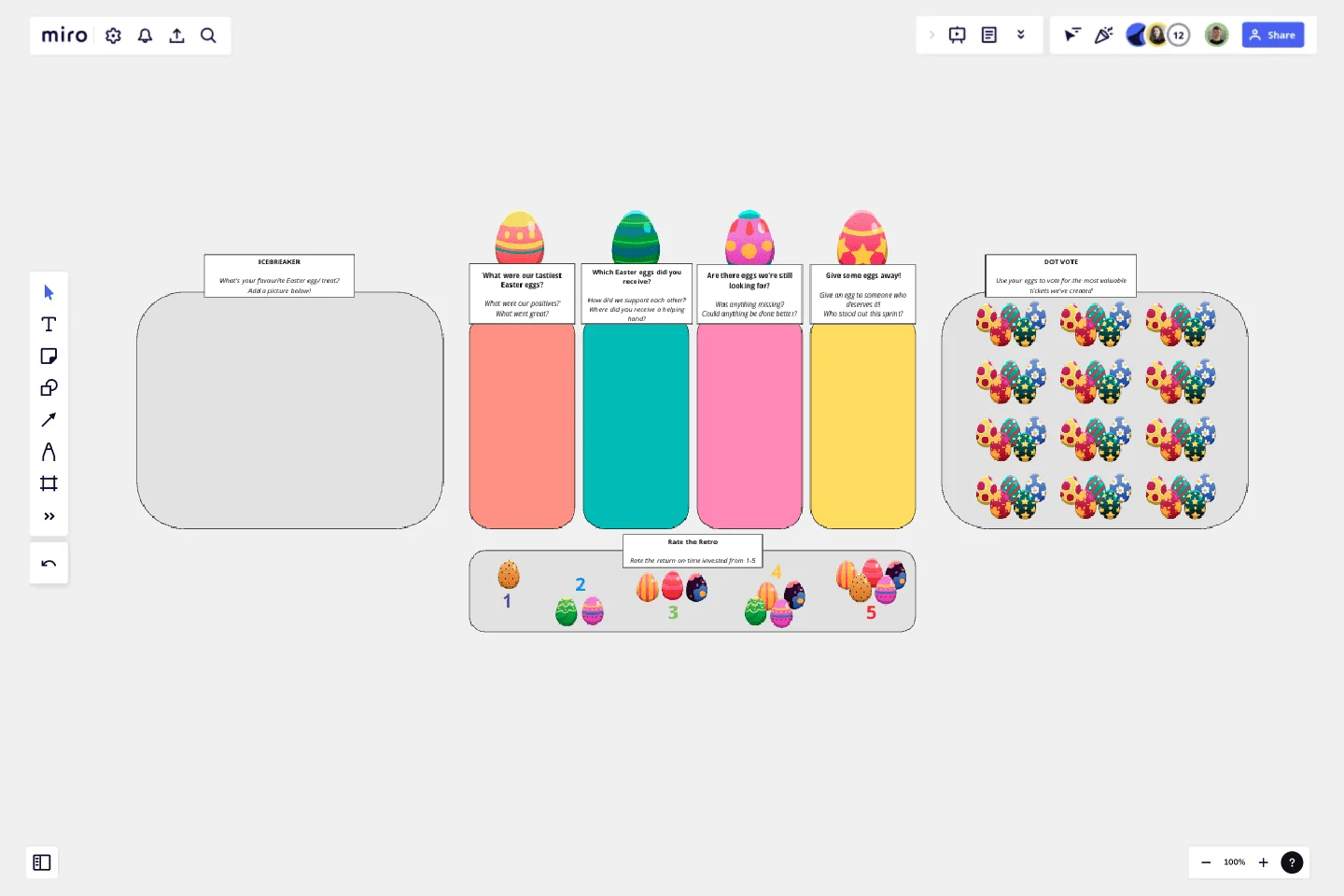Easter Egg Retrospective
Reflect on past performance and set next steps.
Reflect on past performance and identify opportunities for continuous improvement with the Easter Egg retrospective template.
Guidance for use:
Stage 1 - Icebreaker
Get the conversation flowing with a tasty icebreaker where participants share an image of their favourite easter treat or snack with the group!
Stage 2 - Easter Egg Retrospective
Teams will then make their way around the board adding their thoughts and feelings while covering each of the themes listed:
- What were our tastiest Easter eggs?
What were our positives?
What went great?
- Which Easter eggs did you receive?
How did we support each other?
Where did you receive a helping hand?
- Are there eggs we're still looking for?
Was anything missing?
Could anything be done better?
- Give some eggs away!
Give an egg to someone who deserves it!
Who stood out this sprint?
Stage 3 - Dot Vote
Team members use their egg tokens to vote for the most valuable tickets that we're created and will lead to the most constructive steps moving forward.
Stage 4 - Rate the Retro
Once all areas of the board have been covered invite the team to rate the retro by placing a dot/ shape/ post-it on the appropriate rating from 1 (Waste of time) to 5 (Productive and engaging session)
Templated created by David Westgarth.
Discover Miro's online retrospective tool and run more engaging and inclusive meetings.
Get started with this template right now.
Breakout Group Template
Works best for:
Education, Team Meetings, Workshops
Breakout groups provide an excellent opportunity for teammates to have candid conversations and connect on a more intimate level than is possible during a broader meeting. When you’re in a large group setting, it can be difficult for people to feel safe or comfortable speaking up. In a smaller group, participants can feel safer sharing their ideas. Since the group is more intimate, teams are empowered to participate rather than observe.
Midnight Sailboat Retrospective
Works best for:
Retrospectives, Meetings, Agile Methodology
The Midnight Sailboat Retrospective template offers a metaphorical journey through past experiences and future aspirations, likening the retrospective process to a midnight sailboat voyage. It provides elements for reflecting on challenges faced, lessons learned, and goals for the future. This template enables teams to navigate uncertainties, chart a course for success, and foster a culture of resilience. By promoting reflection and metaphorical thinking, the Midnight Sailboat Retrospective empowers teams to overcome obstacles, embrace change, and sail towards their goals effectively.
Service Blueprint Template
Works best for:
Desk Research, Operations, Market Research
The Service Blueprint template is a visual tool for designing and optimizing service experiences. It provides a structured framework for mapping customer journeys, identifying touchpoints, and aligning internal processes. This template enables teams to visualize the entire service ecosystem, uncover pain points, and innovate solutions to enhance customer satisfaction. By promoting customer-centricity and collaboration, the Service Blueprint empowers organizations to deliver exceptional service experiences and drive sustainable growth.
Plus Delta Template
Works best for:
Software Development, Meetings, Retrospectives
The Plus Delta template is a simple but powerful tool for collecting constructive criticism from a group. The format encourages you and your team to focus on what went well, what you should repeat in the future, and what you should aim to change. To complete a Plus Delta template, simply make note of things that are working and things you would like to improve. You can then file these elements into two separate columns. Use Plus Delta to showcase wins and learnings for your team, stakeholders, employees, and bosses.
User Interview Template
Works best for:
Desk Research, Product Management
A user interview is a UX research technique in which researchers ask the user questions about a topic. They allow your team to quickly and easily collect user data and learn more about your users. In general, organizations conduct user interviews to gather background data, to understand how people use technology, to take a snapshot of how users interact with a product, to understand user objectives and motivations, and to find users’ pain points. Use this template to record notes during an interview to ensure you’re gathering the data you need to create personas.
Lean Change Self-Starter Kit
Works best for:
Agile
The Lean Change Self-Starter Kit is a comprehensive resource for initiating organizational change using Lean principles. It provides tools and templates for assessing readiness, defining change objectives, and planning interventions. This template empowers change agents to navigate complexity, engage stakeholders, and drive meaningful transformation. By promoting adaptability and experimentation, the Lean Change Self-Starter Kit enables organizations to embrace change as a competitive advantage and achieve sustainable growth.
